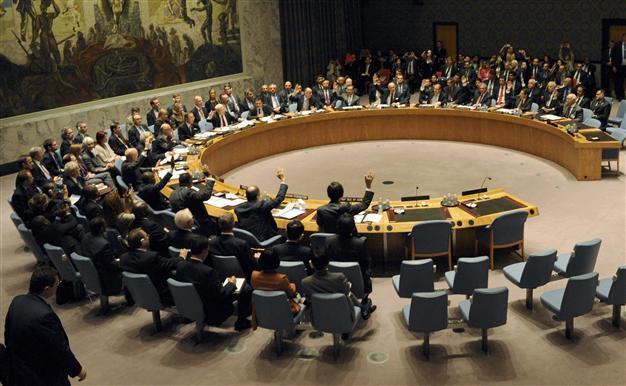Saudi rejects seat on 'double-standards' Security Council
RIYADH / UNITED NATIONS - Agence France-Presse

REUTERS Photo
Saudi Arabia rejected membership of the UN Security Council on Friday, a day after it was elected to the body, accusing it of "double-standards" in resolving world conflicts.
"Work mechanisms and double-standards on the Security Council prevent it from carrying out its duties and assuming its responsibilities in keeping world peace," the foreign ministry said.
"Therefore Saudi Arabia... has no other option but to turn down Security Council membership until it is reformed and given the means to accomplish its duties and assume its responsiblities in preserving the world's peace and security," a statement said.
For the first time ever, oil-rich, conservative Saudi Arabia won a seat Thursday on the 15-member council, which has a key role in dealing with world conflicts.
Saudi UN Ambassador Abdullah al-Mouallimi said that reflected Riyadh's "long-standing policy in support of moderation and in support of resolving disputes in peaceful means." But the foreign ministry said Saudi Arabia declines to be a member of a body unable to tackle long-standing conflicts in the Middle East or rid the region of the threat of nuclear war.
It pointed specifically to the nearly three-year civil war in Syria and the protracted Palestinian-Israeli conflict, as key reasons.
"Failing to find a solution to the Palestinian cause for 65 years" it said, has led to "numerous wars that have threatened world peace." Likewise, it said, "allowing the regime in Syria to kill its own people with chemical weapons... without confronting it or imposing any deterrent sanctions... is a proof of the inability of the Security Council to carry out its duties and assume its responsibilities." The ministry also criticised the body's "failure" to turn the Middle East into a region free from weapons of mass destruction, including nuclear arms -- in a reference to Iran and Israel.
Saudi withdrawal stuns UN Security CouncilSaudi Arabia's angry rejection of a Security Council seat one day after winning it is a United Nations first that stunned members of the body Friday.
But diplomats said there had been no official notice from Riyadh of its refusal to take up the seat on January 1. It was possible the conservative kingdom could change its mind, they added.
"This is totally unexpected. We all had to look into the council history for a precedent and there is not one," said a Security Council diplomat, speaking on condition of anonymity.
"Campaigning and securing a seat normally takes years of preparation which makes the announcement even more surprising." Saudi Arabia was one of five nations elected by the UN General Assembly to start a two-year term on the 15-member Security Council. The others included Chad, Chile, Lithuania and Nigeria. All had stood unopposed.
"There was nothing controversial about the election. But the government has made it clear in recent weeks that it is concerned about Syria and the Palestine issue," said a second UN diplomat.
"They will have to write to set out their official position and then the UN will have to decide the next step," the envoy added.
"There could be a new election, but it is possible that Saudi Arabia can be persuaded to change its stance." The United Nations secretariat and UN General Assembly president had no immediate comment.
Saudi Arabia won a seat for the first time in Thursday's election.
"Work mechanisms and double-standards on the Security Council prevent it from carrying out its duties and assuming its responsibilities in keeping world peace," the Saudi foreign ministry said in a statement explaining its move.
"Therefore Saudi Arabia... has no other option but to turn down Security Council membership until it is reformed and given the means to accomplish its duties and assume its responsiblities in preserving the world's peace and security," it added.
Sunni-ruled Saudi Arabia is a fierce critic of Shiite Iran's nuclear programme, which the West and Israel suspect of seeking to develop a nuclear weapon, a charge Tehran denies. Israel is the sole, if undeclared, nuclear power in the region.
Saudi Arabia is a major backer of rebels trying to topple Syrian President Bashar al-Assad who is allied to Tehran.
Riyadh has been a vocal critic of the UN's handling of the conflict in Syria, where a peaceful movement that called for reforms emerged in March 2011 and was met with a brutal repression. It quickly escalated into civil war.
Last month, Saudi Foreign Minister Prince Saud al-Faisal refused to speak or even hand out a copy of his speech at the UN General Assembly in anger over the Security Council deadlock on Syria and Palestine.
"It was a sign of the frustration felt," said Nawaf Obaid, a visiting fellow at Harvard University's Belfer Center and an advisor to Saudi officials.
Five countries have permanent seats on the Security Council -- the United States, Britain, France, Russia and China. The other 10 seats are awarded for two-year periods by the General Assembly, which holds a vote every year for five of the seats.
Saudi Arabia was chosen by the 193-member UN General Assembly, along with Chile, Chad, Lithuania and Nigeria.
Security Council powers had cautiously welcomed Saudi Arabia's election.
"Having them on the Security Council allows you to debate those issues in a way which you can't if they are not on the council," said one UN diplomat.
